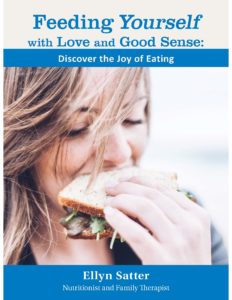
The Satter Eating Competence Model
Evidence for the Satter approach to eating.ecSatter
For detailed references, click here.
At the heart of a good relationship with food is the principle of Eating Competence. Eating Competence, as defined by the Satter Eating Competence Model (ecSatter), is being positive, comfortable, and flexible with eating as well as matter-of-fact and reliable about getting enough to eat of personally enjoyable, nourishing food.1 Even though ecSatter says nothing at all about what or how much to eat or what to weigh, people who are Eating Competent (EC) have better diets, lower BMIs, superior metabolic profiles, more-positive quality of life indicators, are more active, do better with respect to managing a limited food budget, and do better with respect to parenting with food. Validated ecSatter measurement evolved from ecSI2 through ecSI/LI, a revised version accessible to low-income subjects, to ecSI 2.0, the official version valid across all income levels.3 To get permission to use ecSI 2.0 in clinical practice, education, or research, at no charge, click here.
EC show superior diets
Even though ecSatter doesn’t emphasize eating “healthy” food and avoiding “unhealthy” food, and, instead, gives strong permission to eat preferred food, people who are EC do better nutritionally and with FV availability.
EC show superior wellness, medical nutrition therapy measures
Even though ecSatter gives strong permission to eat preferred food and encourages using fat, salt, and sugar to make food taste good, people who are EC show superior wellness and metabolic indicators.
EC show lower BMI
Even though ecSatter does not encourage striving in any way for weight loss and, instead, encourages eating as much as is desired of preferred food and letting weight find its own level, people who are EC have the same or lower BMIs.
EC did better with low-income food management
Even though ecSatter offers no particular guidance on budgeting or food resource management, low-income EC tend to see themselves as food secure, whereas equally low-income non-EC are more likely to characterize themselves as food insecure. EC do better with respect to managing limited food resources.
EC show lower eating-disorder-related symptomology
Even though ecSatter is about eating, EC affects quality of life and is therefore protective against eating disorders. EC captures positive eating attitudes and behaviors, which both reflect and act as a proxy for other quality of life indicators. EC, mental health, and self-care all depend on detecting, respecting, and responding to feelings and preferences. Direct measures of quality of life (sleep, activity), mental health (emotional, psychological, and social well-being), and physical self-esteem all correlate with EC. EC have lower body dysmorphic and psychological symptoms of eating disorders.
EC showed higher activity
Even though ecSatter says nothing about activity, EC have higher levels of physical activity and indicators of activity.
EC show better parenting with food
Even though ecSatter says nothing about feeding children, EC parents do better with respect to following the Satter Division of Responsibility in Feeding (sDOR) and raising children who have lower nutritional risk.
To keep up with the ecSatter evidence as it emerges, see Evidence-base of Satter Eating Competence Model.
References
- Satter E. Eating Competence: definition and evidence for the Satter Eating Competence Model. J Nutr Educ Behav. 2007;39:S142-S153.
- Lohse B, Satter E, Horacek T, et al. Measuring Eating Competence: psychometric properties and validity of the ecSatter Inventory. J Nutr Educ Behav. 2007;39:S154-S166.
- Krall JS, Lohse B. Validation of a measure of the Satter Eating Competence model with low-income females. Int J Behav Nutr Phys Act. 2011;8. doi:10.1186/1479-5868-8-26 PMC3094263,
- Godleski S, Lohse B, Krall JS. Satter Eating Competence Inventory subscale restructure after confirmatory factor analysis. J Nutr Educ Behav. Jul 23 2019
Explore
Understand and Apply ecSatter
Measure Eating Competence
Are you a Competent Eater?
- Do you feel good about food and about eating—and feel good about feeling good?
- Do you take an interest in food and experiment with unfamiliar food?
- Do you trust yourself to eat enough for you?
- Do you take time to eat? To have regular meals (and snacks) and pay attention while you eat?
The joy of eating
To be a competent eater, be relaxed, self-trusting, and joyful about eating, and take good care of yourself with food. Read more.
Eating: What do we truly want?
What we really want with eating is not the same as what we are supposed to want or maybe even what we want to want. Research with the Satter Eating Competence Model (ecSatter) and the Satter Feeding Dynamics Model (fdSatter) shows that we can safely gratify our wants rather than struggling against them.
- We want to eat as much as we want of food we enjoy . . . without feeling guilty and worrying that our weight will go out of control.
- We want to enjoy delicious food with other people . . . without feeling we are eating too much of the wrong food.
- We want to do a fine job with feeding our children and delight in family meals . . . without fearing they will be sick in later life.
Our wants are inborn
In reality, our wants are supported by our drive to be human and our bodys’ needs for survival.
- Hunger and drive to survive.
- Appetite and the need for pleasure.
- The need to have enjoyable social times with other people.
- Our delight in our children and need to nurture them.
- Our biological inclination to maintain a particular body weight.
Discover the joy of eating
- Feed yourself faithfully.
- Give yourself permission to eat.
- Notice as you learn and grow.

